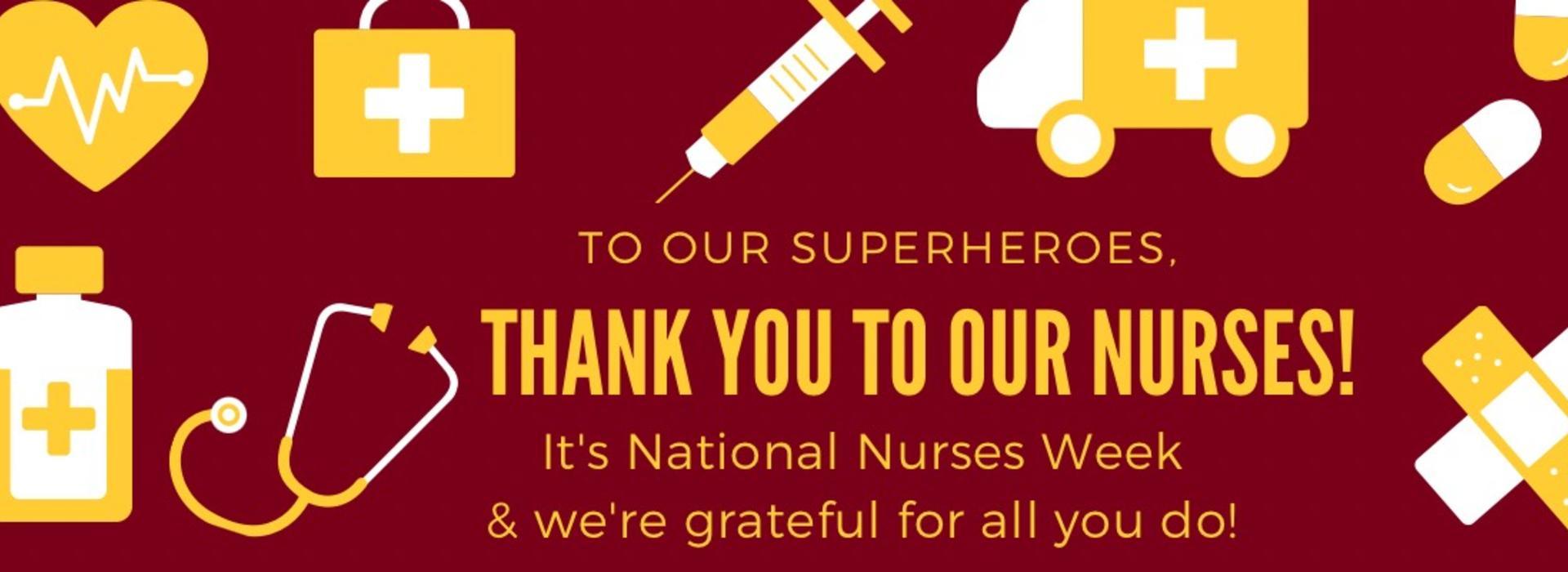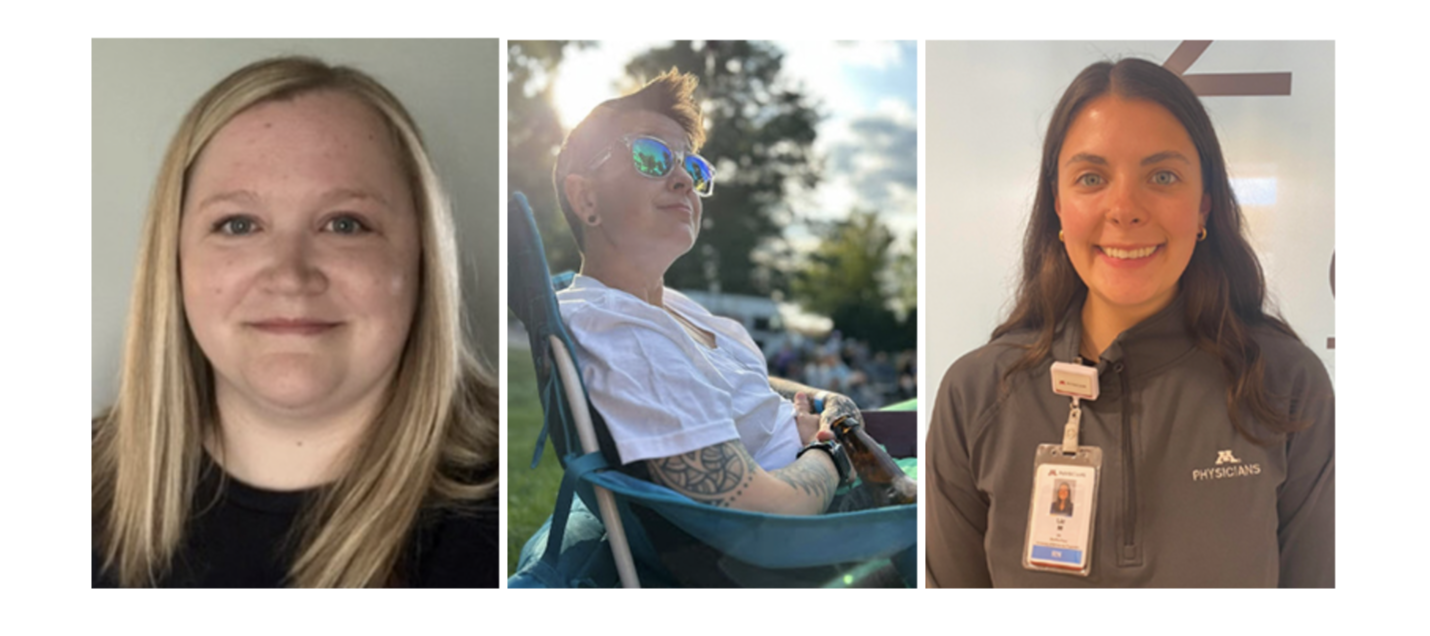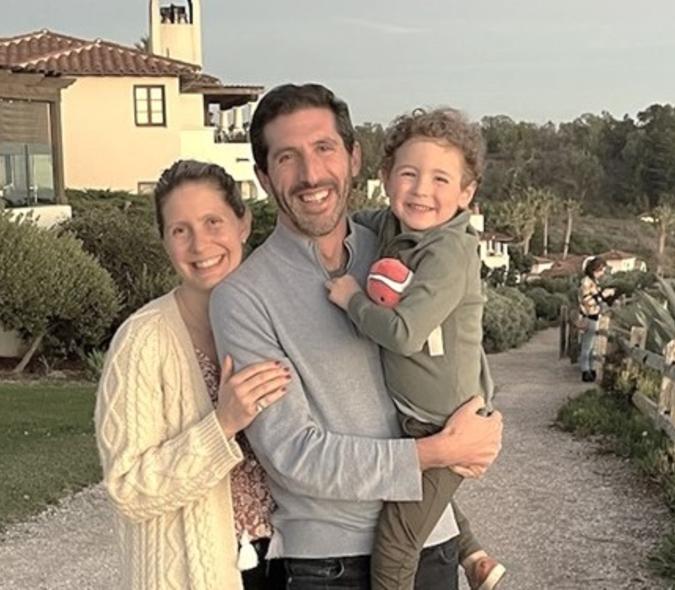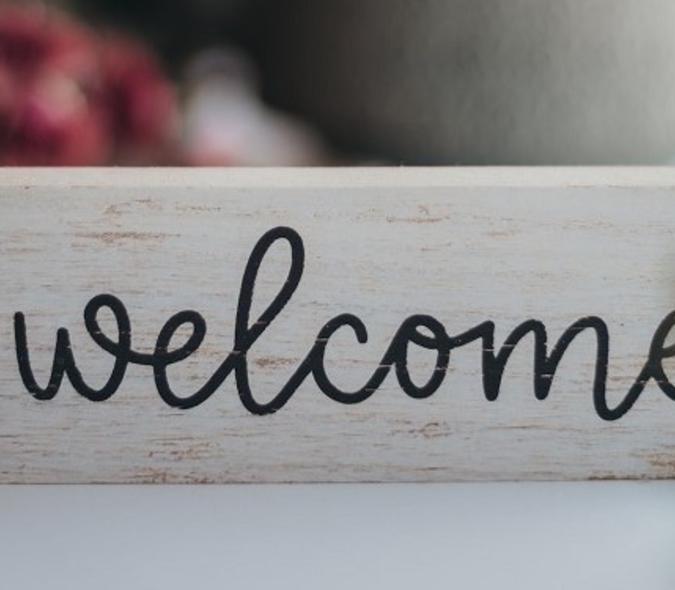
National Nurses Week 2024: 3 RN's took a Q+A and gave us an insight into their healthcare careers
National Nurses Week is more than just a time to say thank you. It's an opportunity to reflect on the immense contributions of these unsung heroes, to acknowledge the challenges they overcome, and to renew our commitment to supporting and uplifting them. To all the nurses out there, this week is for you. Your unwavering commitment to the well-being of others inspires us all.
We asked 3 RN’s Steph Thompson (l) and Megan Murphy (c) who are both based at the Riverside Clinic on the UofM West Bank campus, and Liz Mirkin (r), who is based out at the St. Louis Park clinic, a series of questions to give us an insight into their healthcare careers and some tips for anyone wanting to get into this field.

1) When did you realize that you wanted to become a nurse? Did someone/something inspire you?
S: After I finished my Bachelors in Psychology, I originally planned to go into counseling Psychology. Experience working in a group home made me choose Psych Nursing.
M: I really didn’t want to be a nurse. My Mom and Grandma are/were nurses and I didn’t think I was capable of it. I don’t like blood or guts and hate seeing people in pain. After getting a teaching degree and being unable to find a job, I became a psychiatric associate on an adolescent crisis stabilization unit. I fell in love with the patients. I felt like I was helping people and had finally found my path. After 7 years I decided I needed to take things to the next level and became an RN. I took a position on Station 12, the Adult ITC. I accepted this position on the day my mom retired as the director of that unit. A unit that she helped develop.It was bittersweet and terrifying. I became a nurse on that unit and developed friends that became family (Steph, also in this article). It was one of the most intense experiences of my life and it truly shaped me in a lot of ways, both good and bad. When it became too unsafe is when I decided to move to out-patient. Thanks to my former station 12 family (Steph and Heather) for alerting me to my current position as an RNCC for UMP.
L: Before I knew I wanted to be a nurse, I knew I had a fascination with pathophysiology and the human body. I also knew that I wanted to work in a career that allowed me to have a positive impact on the people of the community I live in. Both of those factors together led me to nursing.
2) What key moments in your career path set your direction? What plans do you have for your professional future?
S: I started working as an inpatient Psych Associate at Fairview while I worked on my Nursing degree. Once I became an RN, I worked for a few years in the inpatient mental health float pool. It gave me invaluable experience working in different areas of mental health nursing, including detox, child/adolescent, ITC, geriatric, and units who specialize in psychosis. I went to the adult ITC mental health unit for about eight years. This was rewarding and very challenging at times. I felt so lucky to have joined the amazing team at UMP Psychiatry Clinic in 2022. The collaboration, innovative work, and genuine care UMP has for their patients make me so proud to work here.
M: Right now, I need to master this position. My primary goal is to be as great a team member as I can possibly be and help our patient population feel safe and heard.
L: Having previously worked a bedside night shift job in an ICU, I was eager when I made the decision to start looking for new jobs that provided a little more work life balance. Applying for the MPhysicians Clinic RN position made me excited to potentially work in a unique and specialized field. After being asked to shadow the clinic, I was able to meet my team who were extremely welcoming and kind. I was drawn to the work that this clinic does and ultimately decided to join them!
3) What interests you about Psychiatry?
S: The mind - body connection is fascinating to me.
M: What’s more important than our mental health? Plus, I was raised by a psychologist, I’ve been asked how things make me feel my whole life.
L: Psychiatry is a very unique field of nursing. A lot of the data we collect as psych nurses is subjective rather than objective, which makes it different. It is interesting because psychiatry focuses a lot on the actual structure/anatomy of the brain, but is also largely affected by external factors. As a psychiatry team, our job is all about gathering information from different perspectives and working as a team to come up with a plan that best fits the patient. Everyone is unique and every treatment plan is unique.
4) What do you love most about your job? What are the challenges you face?
S: What I love about working in mental health is the therapeutic relationships we can develop with our patients. Showing someone that their feelings and experiences matter, and making them feel heard is important to me. The biggest challenge in mental health is the lack of resources for our patients, which has worsened significantly over the past ten years. A lack of inpatient beds, Providers, and safe placement in the community is something we struggled with inpatient.
M: I think I am good at making people feel comfortable and I love helping people feel safe enough to ask for help. I love when I can positively impact someone, and I have opportunities to do that here. I also LOVE the flexibility of this position and my team. It has allowed me to have a better work life balance. The hardest thing for me is learning how to be better virtually. I am an energy person and have always been a nurse that was able to use my presence to make patients comfortable. Now I need to do that over the phone and on a computer. That’s been a huge adjustment for me.
L: My favorite thing about my job is the rapport I am able to establish with my patients. I see patients for ketamine treatments usually on a weekly or bi-weekly basis. We both get to learn about each other when I see them so routinely. We talk about our families, friends, pets, vacations, work, etc. It’s nice to get to know the patients and be able to follow them through their mental health journey. It is especially great to see the patients get better and to know that the work we do with them does help them. Alternatively as a challenge, when patients have a decline, we are there to support them and work as a team to get them back to a healthy place.
5) What advice would you give someone who might want to consider a career in nursing?
S: Please understand the harsh realities of nursing and healthcare in general. The pandemic made this more difficult unfortunately. Nursing is a very rewarding experience, but so challenging. I would definitely recommend it if it's your true passion or calling.
M: Are you sure? It’s worth it, but it’s not easy. Find a team that you can trust, you can not do this work alone. Do not be afraid to say no to assignments and ask lots of questions.
L: Nursing is an ambitious career choice. It takes both a love for patient care and a love for science. One of the best things about nursing is that there are so many options to direct your career path. After nursing school, I had initially went to an inpatient setting, working in an ICU. After about a year there, I realized it wasn’t the best fit for me, but I was able to easily change my direction and find a totally different outpatient job that I now love. There are so many different options for nursing careers, and graduating nursing school is all about finding the job that fits right with you. With nursing, there will be good and bad days, but the feeling of making a difference in people’s lives is rewarding. It’s important to always lean on your nurse friends and co-workers to help you through stressful/difficult situations, because no one understands what a nurse is going through more than another nurse.
6) May is also Mental Health Month. What tips or general advice do you give people wanting to improve their mental health?
S: Make time every day for your interests and passions. Like Megan, I love to be outside gardening in summer - I learned most of what I know about gardening from her. My other go-to's for a mental health boost: get some sunshine, go for a walk or play with my dogs, listen to my favorite music, dance, read, cook a new recipe. Give yourself the same compassion that you would give others. Let’s continue to break the stigma about mental health and talk to each other. You’re not alone!
M: Get outside and find a passion. I’ve always told my patients, coping skills are just passions that distract us. Find your passions and lean into them. I highly recommend gardening, snowboarding, and being near water. Also listening to Brandi Carlile and supporting the MN Vikings always makes me feel better, SKOL.
L: It is important to find time in your day to do something for yourself. It is easy to get caught up in life’s many tasks, but establishing self care is a great way to give yourself a break and do something for you. Things like getting outside on a nice day, journaling for a few minutes, exercising, or reading are examples I like to give my patients.
Thank you for your compassion, your expertise, and your tireless efforts. You are the heartbeat of healthcare, and we are forever grateful for everything you do.



